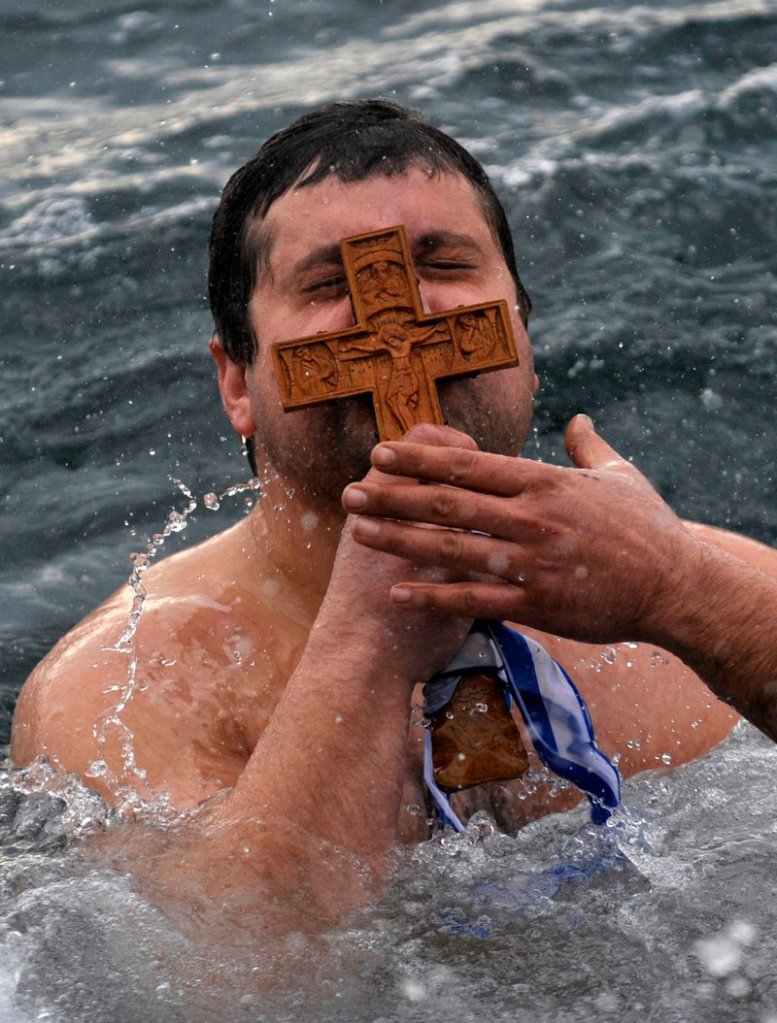ISTANBUL – Orthodox Christian worshippers plunged into chilly waters across southern and eastern Europe on Friday to retrieve crucifixes in ceremonies commemorating the baptism of Jesus Christ.
Hundreds of members of Istanbul’s tiny Greek Orthodox community and tourists from neighboring Greece attended the Epiphany ceremony of the Blessing of the Waters.
About 20 of the faithful leaped into the wintry waters of the Golden Horn inlet to retrieve a wooden cross thrown by the spiritual leader of the world’s Orthodox Christians, Ecumenical Patriarch Bartholomew I.
Apostolos Oikonomou, a 40-year-old Greek participating in the swim for the fourth year, clinched the cross.
“This year I was the lucky guy,” he said. “I will come next year again. I wish everybody peace and happy new year.”
Across Bulgaria, young men also jumped into rivers and lakes to recover crucifixes cast by priests in an old ritual marking the feast of Epiphany. Tradition there holds that the person who retrieves a cross will be freed from evil spirits that might have troubled him.
Priests of Bulgaria’s Orthodox Church said prayers for prosperity and blessed the colors of army units, a tradition abandoned by the communist regime in 1946 and re-established in 1992. President Georgi Parvanov greeted the military parade in Sofia, the capital.
In the mountain city of Kalofer, in central Bulgaria, some 200 men in traditional dress waded into the icy Tundzha River with national flags. Inspired by the music of a folk orchestra and by homemade plum brandy, they danced a slow “mazhko horo,” or men’s dance, stomping on the rocky riverbed.
Led by the town’s mayor, a bass drummer and several bagpipers, the men danced for nearly an hour, up to their waists in the water, pushing away chunks of ice floating on the river.
In the Romanian village of Petrosani, north of Bucharest, some 1,000 villagers gathered for a traditional blessing of horses to give thanks for the animals who play an important role in sustaining livelihoods.
“They drag wood and stones for us, and this is a celebration for them, too,” said Catalin Ristea, a 20-year-old agricultural worker, sporting a cowboy hat on his blond-streaked hair.
Orthodox priests sprinkled more than a dozen horses with holy water, and horses took part in impromptu log-dragging competitions, cheered on by villagers. A tiny Shetland was the star of Epiphany as it doggedly pulled a cart weighed down with some 10 local residents.
Friday’s celebration was crowned by a horse race. Riders without hats, saddles and stirrups charged across the misty fields. Villagers ate spicy meatballs cooked on an open grill and washed down with red wine to celebrate the feast day, while children munched swirls of pink cotton candy.
In Istanbul, dozens of police officers in riot gear stood guard at the outdoor Epiphany ceremony as a precaution following past protests by nationalists against the Patriarchate, which dates from the Byzantine Empire.
Bartholomew has called for the reopening of a theology school near Istanbul that trained generations of church leaders, including himself, until Turkey closed it in 1971 under a law that put religious and military training under state control. The Halki Theological School closed its doors entirely in 1985, when the last five students graduated.
U.S. Vice President Joe Biden, who met Bartholomew on a visit to Turkey last month, said he hoped Turkey would reopen the seminary.
For years, Turkey has said it is working on a formula that could pave the way for the reopening of the seminary. In August, Turkey’s government said it was returning hundreds of properties confiscated from the country’s Christian and Jewish minorities over the past 75 years in a gesture to religious groups that say they still face discrimination.
In Kosovo, minority Serbs who live surrounded by Albanians in the enclave of Gracanica rose early Friday in bitterly cold weather and cut down oak trees from nearby woods, gathering branches to adorn the entrance to their houses as tradition dictates.
Kosovo was the ancient seat of the Serbian Orthodox Church, which has hundreds of monasteries and churches in a region dominated by ethnic Albanians. Kosovo seceded from Serbia in 2008, but Belgrade rejects its claim to statehood. Albanians in Kosovo are mostly Muslim.
Some Orthodox Christian churches, including in Russia, follow a different calendar and mark the holiday Jan. 19.
Catholics also mark Epiphany as a holy day on Jan. 6. Across Poland, believers celebrated with religious processions, including one in Warsaw attended by thousands. The communists banned celebrations of Epiphany, and it was reinstated as a religious holiday only in 2011.
Led by Warsaw Archbishop Kazimierz Nycz, people walked through the city center, sometimes singing religious songs, in a procession that featured camels and people dressed up as magi or in medieval-style clothing. Many wore paper crowns, a reference to the three kings who visited Jesus.
Send questions/comments to the editors.


